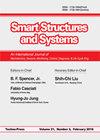Damage detection of bridge structures under unknown seismic excitations using support vector machine based on transmissibility function and wavelet packet energy
IF 2.2
3区 工程技术
Q2 ENGINEERING, CIVIL
引用次数: 0
Abstract
Since it may be hard to obtain the exact external load in practice, damage identification of bridge structures using only structural responses under unknown seismic excitations is an important but challenging task. Since structural responses are determined by both structural properties and seismic excitation, it is necessary to remove the effects of external excitation and only retain the structural information for structural damage identification. In this paper, a data-driven approach using structural responses only is proposed for structural damage alarming and localization of bridge structures. The transmissibility functions (TF) of structural responses are used to eliminate the influence of unknown seismic excitations. Moreover, the inverse Fourier transform of TFs and wavelet packet transform are used to reduce the influence of frequency bands and to extract the damagesensitive feature, respectively. Based on Support vector machines (SVM), structural responses under ambient excitations are used for training SVM. Then, structural responses under unknown seismic excitations are also processed accordingly and used for damage alarming and localization by the trained SMV. The numerical simulation examples of beam-type bridge and a cablestayed bridge under unknown seismic excitations are studied to illustrate the performance of the proposed approach.基于传递函数和小波包能量的支持向量机在未知地震激励下的桥梁结构损伤检测
由于在实践中可能很难获得准确的外载荷,因此仅使用未知地震激励下的结构响应来识别桥梁结构的损伤是一项重要但具有挑战性的任务。由于结构响应由结构特性和地震激励共同决定,因此有必要消除外部激励的影响,只保留结构信息用于结构损伤识别。本文提出了一种仅使用结构响应的数据驱动方法,用于桥梁结构的损伤预警和定位。利用结构响应的传递函数(TF)来消除未知地震激励的影响。此外,TFs的傅立叶逆变换和小波包变换分别用于减少频带的影响和提取损伤敏感特征。基于支持向量机(SVM),利用环境激励下的结构响应来训练SVM。然后,对未知地震激励下的结构响应进行相应处理,并通过训练的SMV进行损伤报警和定位。通过梁式桥和斜拉桥在未知地震激励下的数值模拟实例,说明了该方法的性能。
本文章由计算机程序翻译,如有差异,请以英文原文为准。
求助全文
约1分钟内获得全文
求助全文
来源期刊

Smart Structures and Systems
工程技术-工程:机械
CiteScore
6.50
自引率
8.60%
发文量
0
审稿时长
9 months
期刊介绍:
An International Journal of Mechatronics, Sensors, Monitoring, Control, Diagnosis, and Management airns at providing a major publication channel for researchers in the general area of smart structures and systems. Typical subjects considered by the journal include:
Sensors/Actuators(Materials/devices/ informatics/networking)
Structural Health Monitoring and Control
Diagnosis/Prognosis
Life Cycle Engineering(planning/design/ maintenance/renewal)
and related areas.
 求助内容:
求助内容: 应助结果提醒方式:
应助结果提醒方式:


